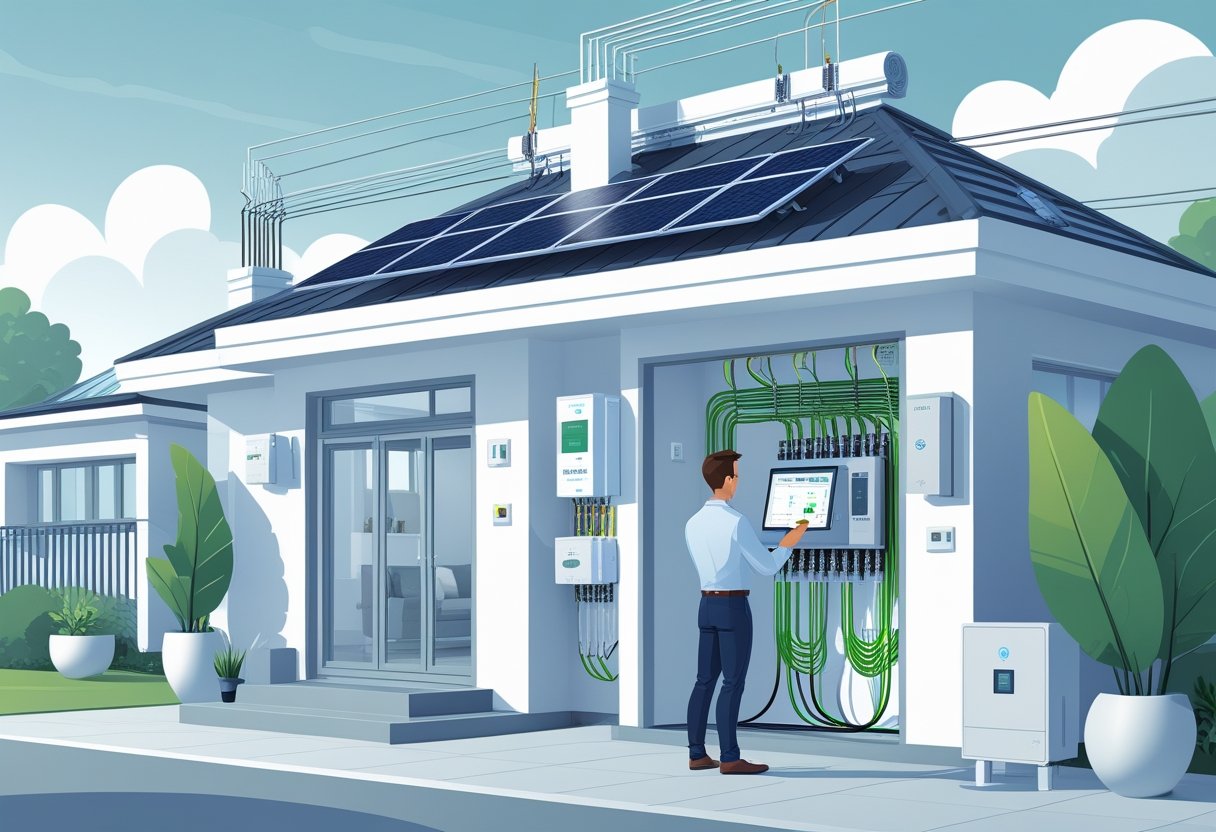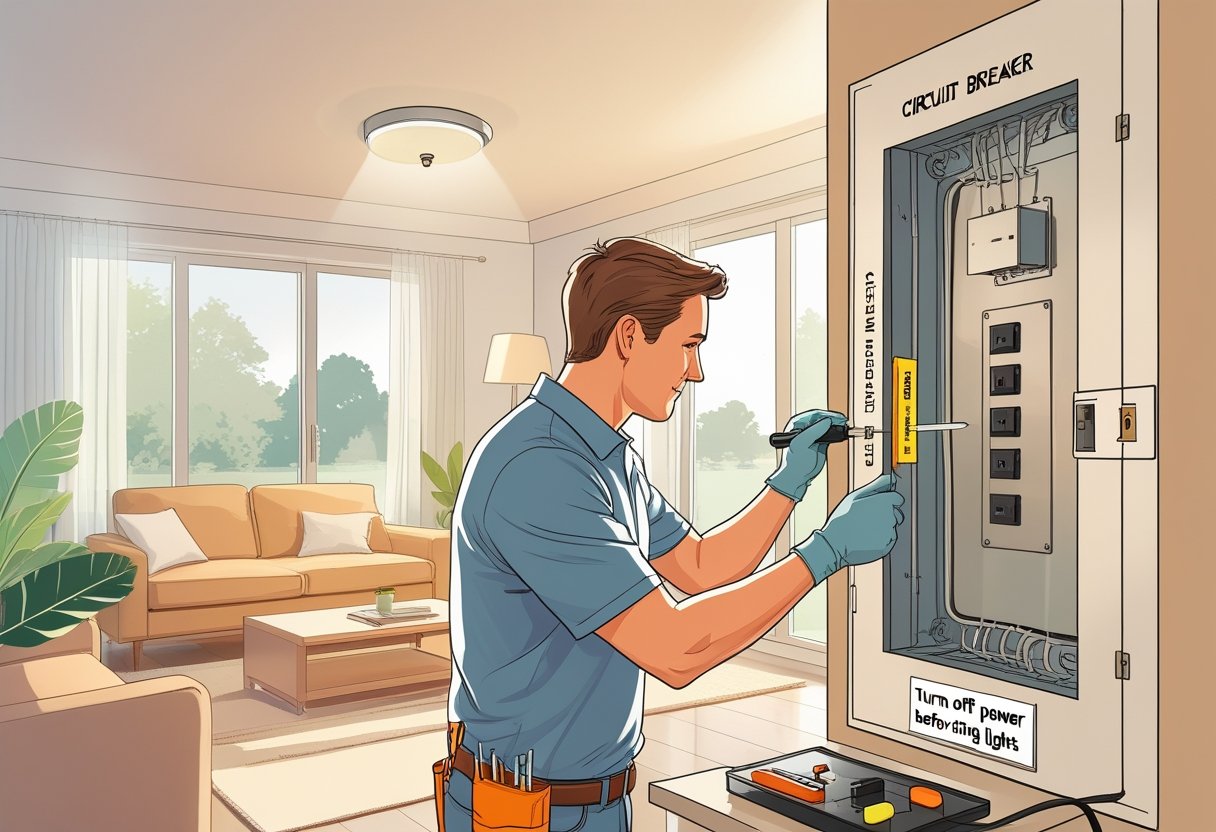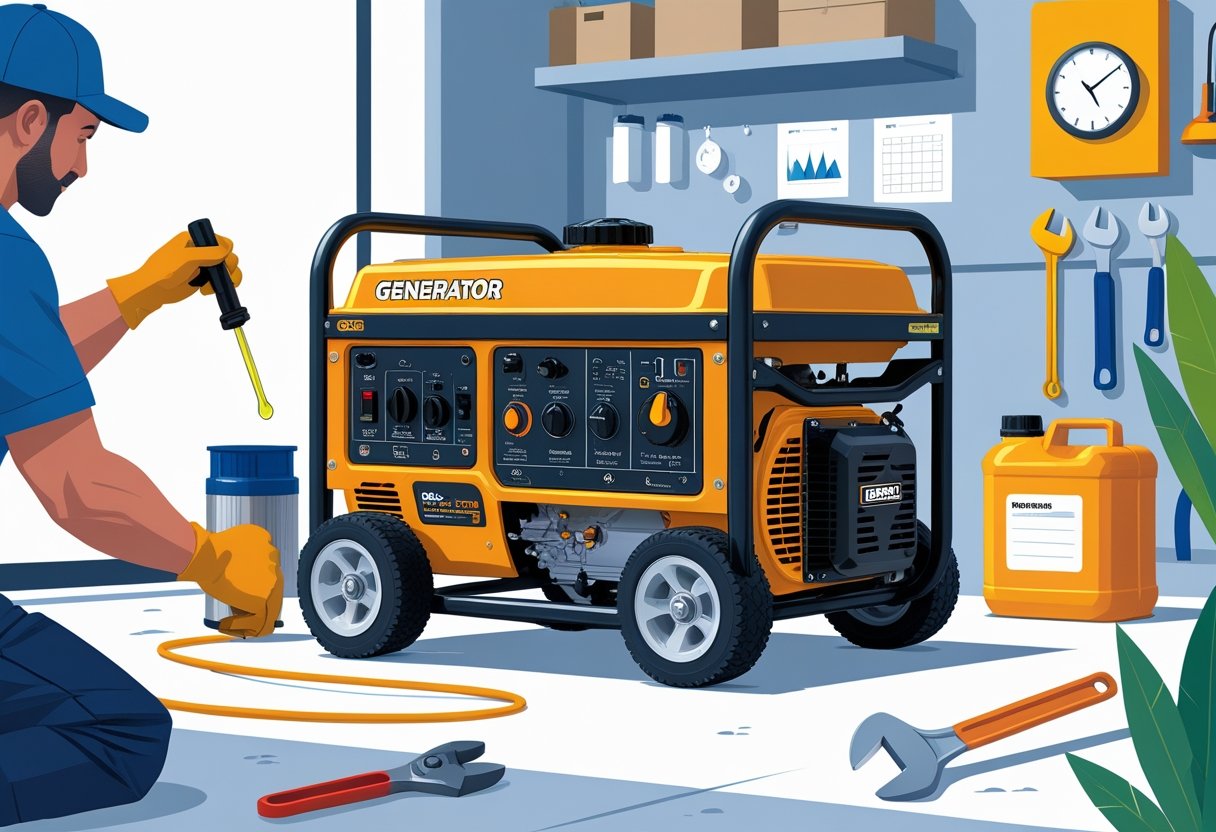When your generator won’t start, it’s a headache—especially if the power’s out and you’re counting on it. Start simple: check the fuel level, battery charge, and see if anything’s loose or if a breaker’s tripped. Believe it or not, these quick checks fix a lot of issues without needing to call anyone.
If you’ve tried the basics and you’re still stuck, having a trustworthy professional on call makes a huge difference. At AAA Electrical Services, we show up fast—usually same day—and our vans are packed with parts, so most repairs happen right away. Sacramento and nearby? We’ve got you covered, with licensed techs who care about safety and honest, upfront pricing.
So, what should you actually do when the generator just won’t cooperate? Here’s a rundown of easy steps you can try yourself, and a little guidance on when it’s time to hand things over to the pros. Nobody wants to be left in the dark, right?
Immediate Steps When Your Generator Won’t Start
If your generator’s giving you trouble, start with the basics. Sometimes, the smallest things—fuel, switches, or a quick look for trouble spots—can get it humming again.
Check Fuel Levels and Quality
Seriously, check the fuel first. An empty or low tank is the #1 reason generators refuse to start.
Use only fresh fuel. Old gas breaks down and causes problems you don’t want. If it’s been sitting for ages, drain it and refill with new stuff.
Propane or natural gas model? Make sure you’ve got supply, the valve’s open, and nothing’s blocked.
Bad fuel can wreck your generator over time. Stay on top of this with regular maintenance.
Inspect the On/Off Switch and Safety Features
Find the main on/off switch and double-check it’s set to “on.” You’d be surprised how often this gets bumped off.
Look at safety features like low-oil sensors or circuit breakers. These are designed to stop the generator if something’s wrong.
If a breaker tripped, reset it gently. If it keeps tripping, don’t force it—just call someone.
AAA Electrical Services offers same-day help if you’re stuck, and they’re upfront about pricing.
Look for Visible Damage or Leaks
Give the generator a good visual inspection. Loose wires? Cracked fuel lines? Worn-out parts?
Check underneath for fuel or oil leaks. Leaks are bad news both for the generator and your safety.
If you spot damage or leaks, stop there. Don’t try to start it. Get a licensed tech on it.
A quick look can save you from bigger headaches and keep your home safe.
Basic Troubleshooting for Common Issues
Still won’t start? Let’s dig a little deeper. The battery, spark plug, air filter, and oil are all common culprits. Checking these can often save you a service call.
Test the Battery and Connections
Check your generator’s battery. Loose, corroded, or damaged terminals are common problems. Use a multimeter—12.6 volts or more is ideal.
If it’s dead or weak, charge or swap it out. Inspect cables for frays or wear. Tighten and clean terminals (baking soda and water is great for corrosion).
A well-maintained battery means fewer headaches. If you’re local, AAA Electrical Services can sort battery issues same day.
Examine the Spark Plug
The spark plug’s job is to ignite the engine. Take it out and look for dirt, cracks, or buildup. Dirty plug? Clean it with a wire brush. Damaged or super worn? Replace it.
Check the gap—too wide or narrow can cause problems. After cleaning or swapping, put it back in snugly.
A good spark plug is key for smooth starts, especially when you’re relying on backup power.
Inspect the Air Filter
A clogged air filter chokes your engine. Pop off the cover and pull out the filter.
If it’s dusty or grimy, tap it out or rinse it if it’s reusable. If it’s torn or just nasty, replace it. Clean filters help your generator run better and last longer.
Check it every few months, more if it’s dusty where you live.
Assess the Oil Level and Condition
Your generator needs the right amount and kind of oil. Low or dirty oil can shut things down fast.
Check with the dipstick before every use. If it’s low, add the right oil—your manual will tell you which kind.
If the oil’s dark or thick, change it. Fresh oil keeps the engine running smooth.
Not sure how? AAA Electrical Services can handle oil checks and changes, with safety always in mind.
Fuel System Problems to Address
Lots of generator problems come down to fuel. Dirty or clogged parts, old fuel, or blocked lines can all keep it from starting. Addressing these gets things moving again.
Clean the Carburetor
The carburetor mixes fuel and air. Dirt and old fuel clog it up over time. If your generator won’t start or runs rough, cleaning the carburetor often helps.
Turn off the fuel, remove the carburetor, and spray it with carburetor cleaner. Don’t soak rubber parts too long. Let it dry, then put it back together.
If you’re not into DIY, a licensed technician from AAA Electrical Services can do this right.
Empty and Refill Old Fuel
Old fuel is a common problem. If it’s over 30 days old, drain it.
Do this in a well-ventilated spot, using an approved container. Fill up with fresh fuel, and use a stabilizer if you’re storing it for a while.
Fresh fuel means fewer problems. If you’d rather not mess with it, AAA Electrical Services can take care of it quickly.
Unclog Fuel Lines
Fuel lines carry gas to the engine. If they’re clogged or cracked, nothing gets through.
Look for cracks, leaks, or blockages. Replace damaged lines. You can clear minor clogs with clean fuel or compressed air.
Keeping the lines in good shape ensures steady fuel flow. If you suspect a problem, professional repairs from AAA Electrical Services can get you running again.
Electrical Components and Starting Mechanisms
Sometimes, the issue’s electrical. Starter motor, fuses, circuit breakers, or the ignition coil can all cause trouble. Checking these can point you in the right direction.
Evaluate the Starter Motor
The starter motor spins the engine to get it going. If you hear clicking but nothing happens, the motor or its connections might be the problem.
Check the wiring for loose connections or corrosion. Make sure the battery’s fully charged.
If everything checks out but it still won’t work, the starter motor might be shot. AAA Electrical Services can diagnose and fix these issues same day.
Review Fuses and Circuit Breakers
Fuses and breakers protect your generator from overloads. Look at the main fuse or breaker first.
Burnt or blown fuses? Replace them. Tripped breakers? Reset them. Too many devices plugged in can cause trips.
Not sure if your breaker’s right for your generator? Let AAA Electrical Services take a look—they’ll make sure you’re set up safely.
Test the Ignition Coil
The ignition coil sparks the engine. Without it, nothing happens.
Find the coil near the engine. Use a multimeter to check resistance—compare it to what your manual says.
If it’s bad, replace it. Ignition work involves high voltage, so if you’re not comfortable, call a pro.
Environmental and Storage Factors
Weather and storage can mess with your generator more than you might think. Cold, moisture, and long idle periods all cause problems like battery drain, fuel gumming up, or rust.
Assess Weather Impacts
Cold weather makes starting harder. Batteries drain quicker in the cold, so double-check the charge. Moisture from rain or snow can rust wires and connections. Look for wet or corroded spots.
If you get rough weather, a weatherproof cover or shelter helps a lot. Inspect fuel lines and filters regularly, since cold can thicken fuel and clog things up.
Resolve Issues from Long-Term Storage
Generators that sit unused for a while develop stale fuel and drained batteries. Old fuel clogs the engine. If it’s been more than a month, drain the tank or use a stabilizer.
Batteries lose juice when idle. Charge it up or jump it if needed. Check the spark plug too—dirt or wear can keep the engine from firing after storage.
If you’d rather not mess with these, AAA Electrical Services can help with quick, safety-focused repairs in Sacramento and nearby areas.
When to Call a Professional for Help
Sometimes, you just need a pro. Some generator problems are serious and can risk your safety or damage the equipment if you try to fix them yourself.
Signs of Major Mechanical Issues
If your generator won’t start reliably, shuts down unexpectedly, or has weak power output or frequent breakdowns, it’s time to call in the experts. Maybe it runs rough or keeps stalling.
These issues often mean internal damage or worn-out parts. DIY fixes can make things worse. A skilled AAA Electrical Services technician can check things out, find the real problem, and fix it fast—their vans are pretty much rolling warehouses, so most repairs happen on the spot.
Unusual Noises or Smells
If your generator starts making weird grinding, knocking, or squealing noises, something’s probably wrong inside the engine or with other important parts. These sounds don’t just fix themselves, unfortunately.
Notice a burning smell—like oil or plastic? Shut it down right away. That’s often a red flag for electrical trouble, overheating, or wiring gone bad. It’s just not safe to keep it running if you catch that kind of odor.
Honestly, the safest move is to stop using the generator and call in a pro. AAA Electrical Services can send out a licensed technician the same day. They’re all about keeping your family safe and won’t hit you with surprise fees.
Preventing Future Starting Problems
Keeping your generator in good shape takes a bit more than just fixing it when it acts up. You’ll want to stick to regular checkups, store it the right way, and pick quality fuel and parts. Doing this makes your generator much more likely to start up when you really need it.
Schedule Regular Maintenance
Set up a routine for maintenance so you can catch small problems before they turn into big headaches. Every few months, or after about 50 hours of use, check the oil, air filter, and spark plugs. Clean or swap out anything that looks dirty or worn—gunk buildup can keep your generator from starting.
It’s a good idea to have a pro from AAA Electrical Services handle a yearly tune-up. They’ll look over the battery, wiring, and fuel lines for any signs of damage or wear. Regular checkups like this help you avoid expensive repairs down the road.
Try keeping a simple log of your maintenance. Just jot down when you change the oil or replace a filter. It’s not fancy, but it helps you stay on track and keeps your generator dependable.
Use Proper Storage Techniques
Keep your generator in a dry, clean spot, away from dust and moisture. If it’s going to sit unused for a while, drain the fuel or add a stabilizer so it doesn’t go bad and clog things up.
Before storing, make sure the battery’s charged. If you won’t use the generator for weeks or months, take the battery out, stash it somewhere cool and dry, and give it a charge now and then.
Cover the generator with something breathable and waterproof. That keeps out weather and pests but doesn’t trap moisture. Good storage habits help your generator stay ready for action and last longer.
Invest in Quality Fuel and Parts
Always use fresh fuel made for generators or small engines. Old gas or cheap stuff can cause clogs and engine problems. If you use gasoline, just buy what you’ll use soon and keep it in approved containers.
Stick with batteries, spark plugs, and filters that match what the manufacturer recommends. Cheap or off-brand parts tend to fail faster and can cause more starting headaches. Not sure what to get? AAA Electrical Services can help with quality replacements, and they usually have parts on hand.
Better fuel and parts mean fewer breakdowns and a generator you can count on. That’s a lot less stress when the power goes out.
Frequently Asked Questions
A lot of generator problems boil down to just a handful of issues. Checking the fuel, battery, and connections often gets things running. Knowing the right steps makes troubleshooting safer and quicker.
How can I troubleshoot a generator that won't start after being unused for a while?
Start with the fuel. Old or stale gas is a common culprit. Drain it out and fill up with fresh gasoline.
Check the battery if your generator has one. Make sure it’s charged and the terminals aren’t corroded or loose. Look over the wires for any issues too.
What steps should I take if my new generator fails to start?
Double-check that the fuel valve’s open and there’s enough fresh fuel. Look at the oil level and top it off if needed.
Test the starter switch and keys. Some generators have a safety switch that needs to be reset or turned off. If it’s still not starting, it might be time to get a professional involved.
What are some common fixes for a portable generator that isn't starting up?
Take a look at the spark plug—clean or replace it if it’s dirty or worn. That alone can solve a lot of starting issues.
Make sure the air filter isn’t clogged. If it’s dirty, swap it out. Also, check that the choke is set right for starting.
Why might my diesel generator fail to start and how can I resolve it?
Diesel generators often have trouble because of clogged fuel filters or air in the fuel line. Try changing the filters and bleeding out any air.
Don’t forget to check the battery and wiring. If the glow plugs aren’t working, starting can be tough in cold weather.
Can you suggest some tips for starting a 2-stroke generator that won't turn on?
Make sure you’re using the right fuel-to-oil mix. Straight gasoline can actually damage the engine.
Clean the spark plug and check for a spark. It’s also worth inspecting the air filter and fuel line to see if anything’s blocking the fuel.
What should I check first when my Briggs and Stratton generator doesn't start?
First off, take a quick peek at the fuel tank—make sure there's actually some fresh gas in there. Low or old fuel trips up a lot of folks. After that, check the oil level; top it off if it's running low.
Now, the spark plug and air filter? Those little guys cause more headaches than you'd think. If they're dirty or look beat up, swap them out or clean them. And hey, if you're still stuck, AAA Electrical Services in Sacramento usually comes through with same-day repairs you can actually count on.





